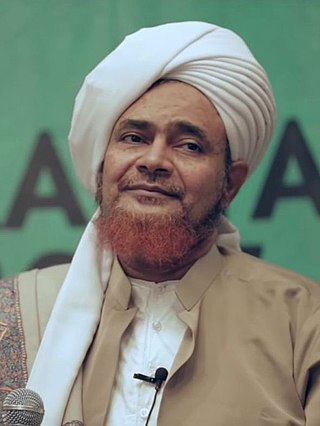
ʿUmar ibn al-Khaṭṭāb was the second Rashidun caliph, ruling from August 634 until his assassination in 644. He succeeded Abu Bakr as the second caliph of the Rashidun Caliphate on 23 August 634. Umar was a senior companion and father-in-law of the Islamic prophet Muhammad. He was also an expert Muslim jurist known for his pious and just nature, which earned him the epithet Al-Fārūq.

Nuʿmān ibn Thābit ibn Zūṭā ibn Marzubān, commonly known by his kunyaAbū Ḥanīfa, or reverently as Imam Abū Ḥanīfa by Sunni Muslims, was a Sunni Muslim theologian and jurist who became the eponymous founder of the Hanafi school of Sunni jurisprudence, which has remained the most widely practised law school in the Sunni tradition, predominating in Central Asia, Afghanistan, Iran, Balkans, Russia, Circassia, Pakistan, Bangladesh, Muslims in India, Turkey, and some parts of the Arab world. He is also called al-Imām al-Aʿẓam and Sirāj al-Aʾimma by some of his Sunni followers.

Umar ibn Abd al-Aziz, commonly known as Umar II, was the eighth Umayyad caliph. He made various significant contributions and reforms to the society, and he has been described as and was called the first Mujaddid and sixth righteous caliph of Islam after Hasan Bin Ali according to some Muslim Scholars.

Daniel Abdal-Hayy Moore was a U.S. poet, essayist and librettist. In 1970 he converted to the Sufi tradition of Islam and changed his name to Abdal-Hayy. He then created works such as Ramadan Sonnets (1996) and The Blind Beekeeper (2002), most works being self-published. In early adulthood Moore traveled widely, living in Morocco, Spain, Algeria, and Nigeria as well as in Santa Barbara in the United States.

Ibn Ṭufail was an Arab Andalusian Muslim polymath: a writer, Islamic philosopher, Islamic theologian, physician, astronomer, and vizier.
This is an alphabetical list of topics related to Islam, the history of Islam, Islamic culture, and the present-day Muslim world, intended to provide inspiration for the creation of new articles and categories. This list is not complete; please add to it as needed. This list may contain multiple transliterations of the same word: please do not delete the multiple alternative spellings—instead, please make redirects to the appropriate pre-existing Wikipedia article if one is present.

Abdāllit: substitutes, but which can also mean "generous" [karīm] and "noble" [sharīf]) is a term used in Islamic metaphysics and Islamic mysticism, both Sunni and Shiite, to refer to a particularly important group of God's saints. In the tradition of Sunni Islam in particular, the concept attained an especially important position in the writings of the Sunni mystics and theologians, whence it appears in the works of Sunni authorities as diverse as Abu Talib al-Makki, Ali Hujwiri, Ibn Asakir, Khwaja Abdullah Ansari, Ibn Arabi, and Ibn Khaldun.

Tawakkul in the Arabic language, is the word for the Islamic concept of the reliance on God or "trusting in God's plan". It is seen as "perfect trust in God and reliance on Him alone." It can also be referred to as God-consciousness. In fact, the Qur'an speaks of the fact that success is only achieved when trust is in God and the believer is steadfast and obeys God's commands.

Zaid Shakir is an American Muslim scholar and co-founder of Zaytuna College in Berkeley, California. He teaches courses on Arabic, law, history, and Islamic spirituality.

Jaʿfar ibn Abī Ṭālib, also known as Jaʿfar aṭ-Ṭayyār was a companion and cousin of the Islamic prophet Muhammad, and an elder brother of Ali.
Zafar Ishaq Ansari was a scholar of Islamic Studies. He was the Director General of the Islamic Research Institute of the International Islamic University. Previously, he was the President of the International Islamic University Islamabad.
Islam is an Abrahamic monotheistic religion teaching that there is only one God (Allah) and that Muhammad is His last Messenger.
Daniel Atzori was born in Milan on May 17, 1981. He is an author, research and commentator as well as political and social analyst.
The Quran contains verses believed by Muslims to be revealed to the Islamic prophet Muhammad at different times and under different circumstances – some exhorting violence against enemies and others urging restraint and conciliation. Because some verses abrogate others, and because some are thought to be general commands while others refer to specific enemies, how the verses are understood and how they relate to each other "has been a central issue in Islamic thinking on war" according to scholars such as Charles Matthews.

Habib Umar bin Hafiz is a Yemeni Sunni and Sufi Islamic scholar, teacher, and founder and dean of Dar al-Mustafa Islamic seminary. He also a member of the Supreme Advisory Council for the Tabah Foundation in Abu Dhabi.

The 500 Most Influential Muslims is an annual publication first published in 2009, which ranks the most influential Muslims in the world.
ʿUmar ibn al-Walīd ibn ʿAbd al-Malik was an Umayyad prince, commander in the Arab–Byzantine wars and the governor of Jund al-Urdunn during the reign of his father al-Walid I. He may have patronized the Umayyad desert palaces of Khirbat al-Minya in modern Israel and Qasr Kharana in modern Jordan.
Islamic neo-traditionalism is a contemporary strand of Sunni Islam that emphasizes adherence to the four principal Sunni schools of law (madhahib), belief in one of the Ash'ari, Maturidi and Athari schools of theology and the practice of tasawuff (Sufism), which its followers consider to be representative of the classical Sunni tradition.
Umar ibn Ubayd Allah ibn Ma'mar al-Taymi was a commander of the Zubayrid and Umayyad caliphates in their wars with the Kharijites and the chief of the Banu Taym clan of the Quraysh in the late 7th century.
ʿAbd ar-Rabb Jaunpūrī was an Indian Muslim scholar, author and teacher. He was associated with Taiyuni reformist movement, founded by his grandfather Karamat Ali Jaunpuri, and succeeded his uncle Hafiz Ahmad Jaunpuri as the leader of the movement in 1899.









